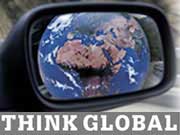May 15, 2005
 |
| Kola Coker, a native of Nigeria, lives in Champlin, Minnesota. (MPR Photo/Julie Siple) |
Champlin, Minn. — Kola Coker is from the state of Lagos in southwestern Nigeria. He belongs to the Yoruba ethnic group. Coker, 61, came to Minnesota in 2000 and now lives in Champlin with his wife and three of his children. His eldest son is still in Nigeria; Coker has filed a request to bring him to the U.S. to join the family.
In Nigeria, Coker studied mathematics and education. He worked for the Ministry of Education, then started his own business. In Minnesota, he works with developmentally disabled adults at Mount Olivet Rolling Acres.
Coker and his family came to the U.S. through the Diversity Visa Lottery Program, in which the U.S. government issues 50,000 immigrant visas each year to people who come from countries with low rates of immigration to the U.S.
The lottery's goal is to broaden the nation's pool of immigrants. Winners are chosen randomly from all qualified entries, and millions of people apply every year. Lottery winners are allowed to bring their spouse and any unmarried children under the age of 21.
Nigeria, which lies on the west African coast between Benin and Cameroon, is the most populous country in Africa. It is home to more than 128 million people. Lagos, its largest city, has a population surpassing 10 million.
Nigeria is comprised of more than 250 different ethnic groups. The largest ones are the Hausa and Fulani in the north, the Yoruba in the southwest, and the Igbo in the southeast.
The country's official language is English, although a large number of African languages are spoken. The country is approximately 50 percent Muslim and 40 percent Christian; 10 percent of people follow indigenous beliefs.
Nigeria is led by President Olusegun Obasanjo. The country has substantial oil wealth, but more than 60 percent of people live in poverty (according to 2000 estimates from the U.S. government).





